Del reviews ‘Smile 2’

Pop singer Skye Riley finds herself being stalked by the Smile Entity in the followup to the viral horror movie hit "Smile" from 2022. This new excursion into that universe is even bloodier than the first. Paramount Pictures.
“Smile 2” Starring Naomi Scott, Rosemarie DeWitt, Lukas Gage. Directed by Parker Finn. Two hours, 7 minutes. Rated R. Theatrical release.
Plot summary: Comeback rock star Skye Riley finds herself stalked by the Smile Entity after witnessing the gruesome suicide of former classmate and sometime drug provider Lewis. A stranger, Morris, offers her a possible way of beating the entity.
Spoilers? None.
Del’s take
Halfway through “Smile 2” the couple behind me got up and left. I should have gone with them.
I didn’t like the movie.

Critics are raving. It was the top box-office draw its opening weekend. It’s well made and well acted. Director Finn and distributor Paramount are thinking about a threequel, I bet.
But lowly I, me, yours truly, didn’t like it. Why?
Because once upon a time horror movies were scary. “Smile 2” isn’t scary. It’s gross, violent and depressing, but it’s not scary.
I will say this: It’s got the coolest soundtrack I’ve heard in recent memory. And the cinematography was awesome. Upside aerials over the city? Very cool.
And the talent was invested in this film, no doubt. Naomi Scott and Rosemarie DeWitt were terrific. The others were good, some even memorable, like the creepy little girl at the meet-and-greet, who spoke nary a word but stared – and smiled.

But what can I say? I didn’t like the movie.
I remember a day when horror movies relied on storytelling, tension, and the audience’s imagination to make them scary. These days it’s all about jump scares and gore, and “Smile 2” is generously endowed with both. We get to see faces smashed with gym weights, jawbones ripped from skulls, daggers of glass pulled from bloody feet – it goes on and on. After awhile you just sit there in your movie theater seat, the soles of your shoes sticking to the gooey floor as this bloody spectacle plays out on the screen, the last molecule of empathy in your body bludgeoned into senselessness. The couple behind me missed the really bad parts.
Plus, it’s hard to feel anything for people who are so shitty, and every character in this movie is a creep to some degree, from burned-out ex-junkie Skye (Naomi Scott) to her insufferable stage mom Elizabeth (Rosemarie DeWitt) and looney drug dealer Lewis (Lukas Gage). Who cares if any of these guys gets a bedazzled microphone shoved through the eye?

Finally, what is the point of all this? What kind of object lesson are we supposed to learn? I tried to decide if “Smile 2” was a treatise on the wages of guilt, or a condemnation of the hollowness of fame and those who chase it. In the end I decided it was nothing but a pointless bloodbath.
But don’t listen to me. The critics love it, and so do moviegoers. Box Office Mojo reports “Smile 2” earned $23 million its first weekend, which topped the charts. All those people, and all that money, can’t be wrong. Right?
I give it a grade of C. Too bloody, too violent, too depressing for lowly me.
Del Stone Jr. is a former journalist and writer.
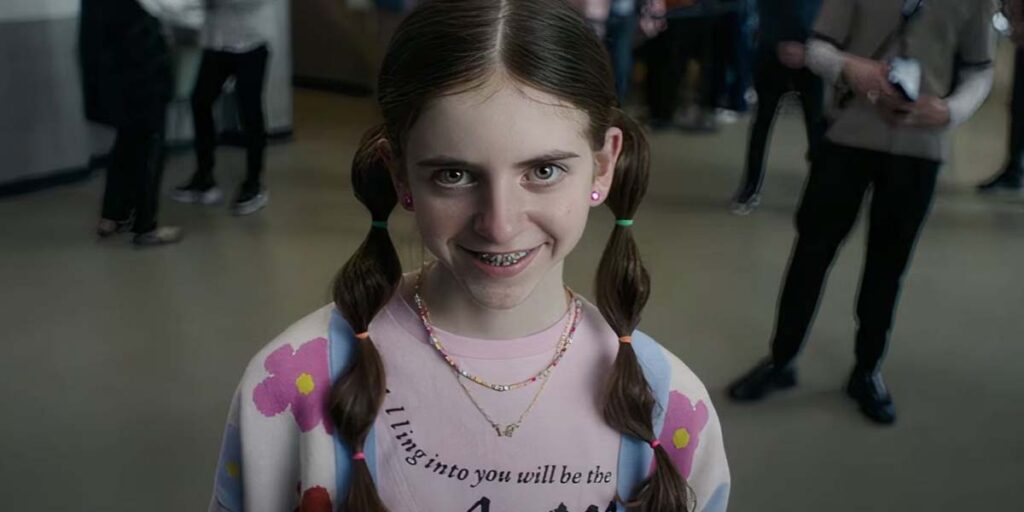
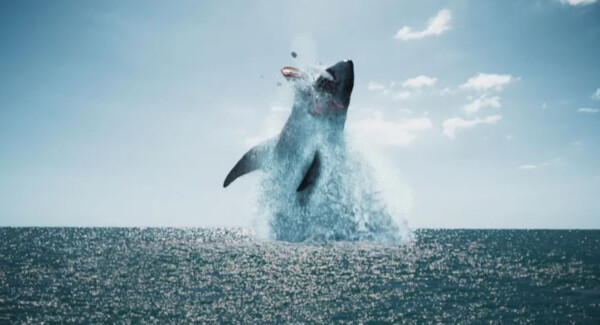
Image courtesy of The Avenue.
Starring Fernanda Urrejola as “Ines,” Josh Lucas as “Paul,” Venus Ariel as “Audrey,” Julio Cesar Cedillo as “Chato,” and Jorge A. Jimenez as “Junior” and others; Directed by Adrian Grunberg; Rated R; 100 minutes; Amazon Prime
Mladen’s take
Like a good movie can be ruined by one bad scene, a bad movie can be redeemed with one good bit of filmmaking. The problem with “The Black Demon” is that you must watch the mostly bad movie to the end to see that one good scene. You’ll know when you see it because the antagonist and the protagonist are calm when death arrives.
“The Black Demon” offers a duel between a big shark body armored with sturgeon-like scutes and humans of varied races and socioeconomic status. The big shark is the Aztec god Tlaloc incarnate. Come to think of it, maybe that’s also a reason I found the film good enough. The gringos in “The Black Demon” are unable to pronounce the name of the god without help from native Spanish speakers. The “Tl” in Tlaloc throws English speakers off balance. As a guy with a first name that also juxtaposes two seldom, if ever, side-to-side consonants in the English language, “Ml,” I sympathized with the villagers trying to teach Americans the correct pronunciation.
Anyway, Tlaloc, the god in shark’s clothing, appears as a deformed megalodon to avenge the destruction of a riveting sea polluted by the unchecked gush of oil from an offshore rig. Huh, a riveting sea polluted by the unchecked gush of oil from an offshore rig. Sound familiar? You’ve already forgotten the months-long British Petroleum Deepwater Horizon oil hemorrhage in 2010 that all but wrecked my beloved Gulf of Mexico, haven’t you?
Of course, the humans hunted by the black demon find themselves stranded on the oil rig without a way to communicate with shore or hope that some boater will come along to rescue them. And, there’s no way for the humans to wait for someone on land to realize they’re missing and send a search party because the rig is falling apart. Its demise is aided by Tlaloc occasionally ramming it. Oh, the shark god has some sort of telepathic power that allows it to conjure foreboding hallucinations in humans when they’re in the water.
The movie’s cheap thrills come along by placing children in harm’s way. I hate that. And, there’s always the accidental fall into the water or the decision to kill the shark by using a person as live bait and then what? Poison the multi-ton shark by pricking it in the mouth with a 5-inch-long, 25-gauge hypodermic needle? No, no, that was “Jaws.” Explode the shark with a jerry-rigged dart bomb triggered by attaching the contraption via cable to a car battery? No, that was “Deep Blue Sea.” Damn, how was the meg in “Meg” whacked?
Del will belly ache about the movie’s derivative character. He’ll complain about the mediocre CGI. All of that will come after he details to the nth minutia the history of big shark movies and their impact on pop culture, our eating habits, environmental preservation, and treatment of toenail fungus. My advice to you? See the movie because it’s good enough to be entertaining and among the better of the B-schlock films that have blazed across the big screen since pictures started moving.

Del’s take
Poor Mladen.
By the way, I pronounce that “muh-LAH-den.” As far as I know, that’s correct. I pronounce the Aztec god Tlaloc “tuh-LAL-oc.” I think that’s correct. And Mladen thinks I dwell too much on detail.
Yes, I’m a gringo who mispronounces the names of Aztec fish gods. I also recognize the role sharks play in the environment, but like many gringos who can’t pronounce the names of Aztec fish gods, I don’t want to be on the receiving end of that environmental role when it means having the lower half of my body reduced to shark kibble. So I’m a fan of sharks only if they come no closer than the movie screen – speaking of which, did I mention I’m tired of movies about sharks. I mean, what are we up to now? “Jaws 47”? “Meg XXXI”? “Deep Blue Sea: The Neverending Story”?
Mladen, by making me watch “The Black Demon,” thought he was punishing me for inflicting “Chopping Mall” and “Barbie” on him. I didn’t have the heart to tell him I’d already seen “The Black Demon,” already noted the shitty FX, and yes, already thought it was stupid.
“The Black Demon” is a good example of the chaff Amazon Prime uses to flesh out its movie offerings. While there’s room in my heart for bad sci-fi and horror movies, that room is leavened by nostalgia. I don’t watch “The Tingler” or “The Giant Claw” for their riveting depictions of human drama. I watch them because they remind me of when I was a little kid and believed that crap could actually happen. Alas, “The Black Demon” does not evoke such happy memories. It’s the seaside version of “Maximum Overdrive.” I watched it, didn’t like it, and flushed it down the toilet, like you would that favorite swordtail you found floating belly up in your aquarium.
I mean, c’mon. The premise of “The Black Demon” is idiotic. An American petrochemical engineer takes his wife and kids on one last job in Mexico, leaves them in a town full of hostile locals, makes his way to a haunted oil rig, the wife and kids follow along, everyone except one altruistic soul are in league with the shark, and somehow they’re supposed to defeat this – this creature that’s big enough to take out an oil rig and swims faster than a speeding cigarette boat? Next you’ll be telling me Marjorie Taylor Greene has an IQ higher than a cement block.
One point on which I and the movie agree: The real villain is the corporation responsible for the leaky oil rig, in this case an outfit called “Nixon.” Get it? Nixon, so very, very subtle. Why didn’t they just call it “Satan” and be done with it? And the real black demon may not be the shark or the pissed-off fish god, but the stuff leaking from the oil rig. But somehow I doubt that much thought was put into the movie’s subtext. In fact, I don’t think there is any subtext. I think “The Black Demon” is a movie about a supernatural shark picking off people responsible for trashing the environment in and around the oil rig. Or more basically, a movie about a scary shark-like something-or-other.
I’ll grade this movie a C- because I’ve spent worse hour-and-forty-minute time spans of my life, but unless you’re a fan of modern schlock, which I’m not, then stay out of the water.
For a real shark movie check out “Blue Water, White Death,” a darned good doc from the early ’70s. They don’t make those, or schlocky B-movies, like they used to.
Mladen Rudman is a former journalist and technical writer. Del Stone Jr. is a former journalist and writer.
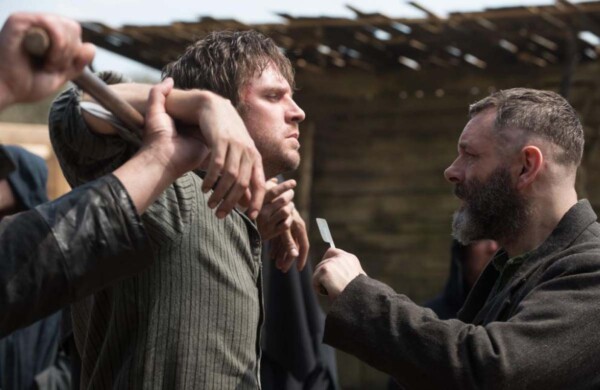
Image courtesy of Severn Screen.
“Apostle” Starring Dan Stevens as Thomas Richardson, Michael Sheen as Malcolm, Richard Elfyn as Charles, Paul Higgins as Frank, Bill Milner as Jeremy, Catrin Aaron as Elaine, Lucy Boynton as Andrea Howe, and others. Directed by Gareth Evans. 2 hours, 10 minutes. Rated TV-MA. Streaming on Netflix.
Plot summary: A man goes undercover to rescue his sister from the clutches of a religious cult that has taken up residence on a secluded island. During his attempt to free his sister he discovers a horrifying secret being kept by cult leaders.
Are there spoilers in this review: Yes. Read at your peril.
Del’s take
“Apostle” is two movies in one.
On the surface it’s a high-tension thriller about a man trying to rescue his sister from the clutches of a religious cult. But it’s also about a uniquely weird and horrifying supernatural secret being kept within the bleak, windswept hills of a deserted island.
I should have saved this review for Halloween because “Apostle” would fit that bill perfectly – as scarefests go it departs from the usual Spooky Season fare. You’ll find no unkillable slashers, shrieking ghosts or giant reptiles here. Instead, it’s a tense period piece from the debut of the previous century with a quietly anarchic feel, more reminiscent of “Midsommer” and “Wicker Man” than “Friday the 13th.”
I’m not familiar with Evans’ work but I am becoming a fan as “Apostle” is the rare movie that undergoes a tectonic shift in pacing and tone at about the halfway point, and somehow it all works. From quietly tense to madness, “Apostle” asserts the power of suggestion can be a dangerous weapon, but what lies behind that power could be even worse.
“Apostle” is also one of those movies where the setting abets the theme. It was shot mostly in Wales along the coastline and embodies the harsh, threadbare and downright mucky quality of life such locales had to offer in the early 20th century. Rocky coastlines flanked by fields of wiry grass giving way to dark, dank forests, operate as a kind of additional character in the story, similar to the way the cold and snow worked in the original “Let the Right One In.”
But it’s what lurks beneath those hills and forests that really drives the story, and while its presence is hinted at in the first half of the film, the second half becomes a quest to bring everything into the rational light of day while defeating the antagonists and acquitting the victims. At this point “Apostle” goes from slow burn to a furious boil of gore, blood, and horror layered upon horror, much like events leading up to the climatic scene in “Texas Chainsaw Massacre.”
All the actors were terrific in this film, but Dan Stevens’ desperate Thomas Richardson stands above the others. Also notable were Lucy Boynton as skeptical Andrea Howe and Bill Milner as the callow Jeremy. If I had to criticize the movie for anything, it would be the relative unlikability of Thomas, who seemed to hover somewhere between devoted rescuer and drug-addicted looney.
Mladen is already crabbing about it not having lots of foul language or sex. There are sex scenes, but I’d describe them as demur. As for the cussing, well, what can I say? This was turn-of-the-century England, not MAGA America.
I’ve watched movies that in one small way or another remind me of parts of “Apostle,” but I think it’s safe to say you’ve never seen anything like it. Evans tells a fascinating and entertaining story, one that’s worth your 2-hour, 10-minute commitment to watch it.
You won’t be disappointed.
Del’s score: B+

Mladen’s take
Speaking of MAGA. When I read Del’s summary of “Apostle,” I assumed the movie was about the Republican Party under Trump. I was mistaken. “Apostle” is tame compared to the back-stabbing, power-hoarding, hyper-erratic, yellow-bellied, proudly racist, and gullible males and females classifying themselves as GOP-ers these days.
Also mistaken is Del’s review of “Apostle.” It’s crappy and just barely more tolerable than torture movies such as “Saw” or “Hostel.” Only smart and beautiful redhead Andrea kept me watching because she bridged the gap between the film’s decent portrayal of cultism and its grotesque, nearly gratuitous descent into body horror starting with the brain drill.
The film’s most interesting character is religious sect prophet Malcolm (portrayed by Micheal Sheen). As the cult’s top religionist, Malcolm balances charisma, desperation, and dislike for needed violence, as he defines it, pretty darn well. His sole goal is keeping his colony functioning by eluding an impending doom even if that means shedding the Almighty for paganism. Now that I think about it, that’s interesting. The libertarian god of Malcolm’s beliefs most share space with the nature witch who control the island’s plant life.
“Apostle” costumes and bleak environment, mostly grays and blacks, suit the plot nicely as Del noted but other elements are askew.
First, there’s no way that turn-of-the-19th century Englanders, not to say self-exiled cultists living on the edge of poverty, had such perfect teeth.
Second, our protagonist Thomas is accidently the scariest person in the film. It wasn’t his opium addiction. It wasn’t that Thomas got a man murdered by doing a ticket switch to get on a guarded boat to the unholy island warren of Erisden. It was the persistent expression on his face, particularly the eyes. He looked evil with eyes always darting never blinking and, I don’t know, glowing preternaturally.
Third, where Del sees a wonderful transition from the film’s first half of seething, albeit, discreet menace and hypocrisy to a father murdering his teenaged daughter with a knife, then her teenaged lover with the hand-powered brain drill, then shooting Malcolm with a sawed-off shotgun, and then threatening sexy Andrea and Thomas’s sister, I see a movie running out of ideas to convey the dangers of cults and the rhetoric that inspires regular folk to dive into the deep end of an empty pool.
And, finally, I have no idea why the beast-man with his reed-wrapped head was needed. Yes, the soiled being, apparently, protected and fed the nature witch with blood and flesh from animals and then humans but from where did he come? Who or what was he? Why did Malcolm trust the beast man to care for the increasingly apathetic, or was it disillusioned, pagan who ran the island’s environment. I believe the beast man was inserted into the movie for on scene alone, the one where he tries to grind Thomas into food pellets and strips for the witch. Yuck and a repulsive yuck at that.
I agree with Del. Y’all probably never saw anything like “Apostle” and you may not want to.
Mladen’s score: A generous C because the first half of the movie isn’t bad.
Mladen Rudman is a former journalist and technical writer. Del Stone Jr. is a former journalist and writer.
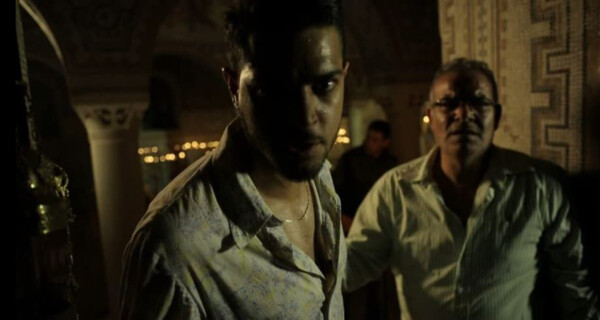
Image courtesy of Epic Pictures Releasing.
“JeruZalem” Starring Yael Grobglas, Yon Tumarkin, Danielle Jadelyn and Tom Graziani. Directed by Doran and Yoav Paz as The PAZ Brothers. 94 minutes. Rated R. Netflix.
Del’s take
The found-footage film has found a home in the horror genre, resulting in classics like “REC,” “V/H/S,” “Troll Hunter” and the grandwitchy of ’em all, “The Blair Witch Project.” It also has produced some amazing clunkers. “Paranormal Entity,” “Area 407” and “Apollo 18” come to mind.
Falling somewhere in between is “JeruZalem,” an unlikely pairing of the weighty and the frothy (Judgment Day from the point of view of a teen girl’s spring break getaway). How far it leans toward “Blair Witch” or “Apollo 18” depends on the moviegoer’s charity. While some people loath found footage as a lazy director’s approach to storytelling, others appreciate its clarity of viewpoint.
I find myself bouncing between those two worldviews. I think movies like “Troll Hunter” and “Cloverfield” are masterpieces of the genre. I even liked “Apollo 18” for what it was – a space-based horror flick with limited ambitions. But some movies don’t benefit from the found-footage viewpoint and “JeruZalem” may be one of them. Third person probably would have been a perfectly acceptable storytelling vantage point, and I would not have been distracted by irrelevant technical details such as how the lead character kept her device charged throughout the apocalypse.
I’ll probably be asking myself the same question about my phone after this Korea thing blows up.

In “JeruZalem,” young Sarah Pullman (Jadelyn) is whisked away from her overprotective and Skype-stalking father (Howard Ripp) for a whirlwind tour of the old city of Jerusalem during Yom Kippur. At the Tel Aviv airport they meet good-looking Kevin Reed (Tumarkin), an antiquities student who promises to hook them up with a hostel in the old city and show them the best clubs and sights.
There, they hook up with Omar, the young hostel owner, who takes them out for a night on the old town and stakes his claim to Rachel (Kevin has already targeted Sarah). They dance the night away as dear old dad vainly tries to Skype his daughter because he has been watching the news and hears that something weird is going on in Jerusalem.
The quartet discover the city has been quarantined and Israeli troops are battling – something. They hear gunfire, explosions and screams in the distance, not to mention an unearthly growling and screeching reminiscent of the time you accidentally shut the door on the cat’s tail.
From that point “JeruZalem” becomes an escape caper with the two American girls and their vacation boyfriends struggling to get out of the old city while monstrous events unfold around them.
The story is displayed from a pair of Google Glass-like eyeglasses that belong to Sarah, and yes, I would really like to know how she kept the damn things charged through her ordeal. My new phone will maintain a charge over a couple of days’ heavy usage, but then my phone has a battery the size of a Pop Tart. Sarah’s Glass didn’t – unless the Pop Tart was hidden in her blouse pocket.
The actors carried their parts effectively and there were no gaping holes in the plot, at least none I would try to drive a truck through. Special effects were acceptable and pacing matched the plot well enough. The found-footage viewpoint was not overly distracting, although at times the integration of technologies struck me as too seamless to be believed.
If I had a substantial criticism it would be that the storytelling mechanism trivializes the subject material. Mysterious stars in the sky over Jerusalem portending a religious disaster, sinister film footage smuggled from the Vatican showing the alleged execution of a demon, and air raid sirens that warn of something far worse than incoming Palestinian rockets are all gamely revealed through the lens of a silly pair of internet-capable glasses that display a frowny face and flash “fatal error” when dropped.
It’s all in the name of fun, however, and I confess I enjoyed “JeruZalem” despite its limited flaws.
I would give the movie a B- grade for its interesting premise, decent plot and pacing, and occasional (although sparse) flashes of genuine weirdness. I mark it down for its found-footage viewpoint, which did not serve the story effectively.
I watched it on Netflix.
Del Stone Jr. is a former journalist and author.
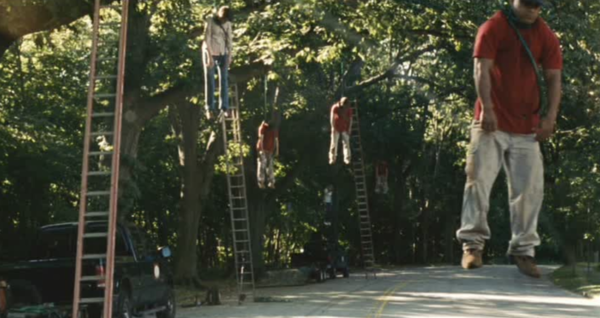
Image courtesy of 20th Century Fox.
—
“The Happening.” Starring Mark Wahlberg, Zooey Deschanel, John Lequizamo, and others. Directed by M. Night Shyamalan. 91 minutes. Rated R.
Del’s take
Terrorists have just attacked your city. An airborne agent is causing people to commit suicide en masse. You are standing in line to board what may the last train out of the danger zone. Do you:
(a) Get in line as quickly as possible and hope you actually find a seat on the train, or
(b) Make everyone wait as you and your wife have a long, soulful conversation about the strains in your marriage.
If this is an M. Night Shyamalan movie the answer is (b) of course, and that scene is emblematic of the problems with what could have been a nifty little horror movie, “The Happening.”
Two giant flaws will keep “The Happening” from joining my DVD collection – at least until it reaches the discount bin at Walmart: writing and direction. Shyamalan has been living off the good will generated by “The Sixth Sense” for many years, but he may have used up that charity. “The Happening” is an unrecoverable mess.
The movie begins with such promise. People in Central Park suddenly begin killing themselves in a plague of violence that spreads across the city. The first five minutes offer some really scary scene-setting – construction workers hurling themselves off a building, and cops shooting themselves in the head with their own guns.
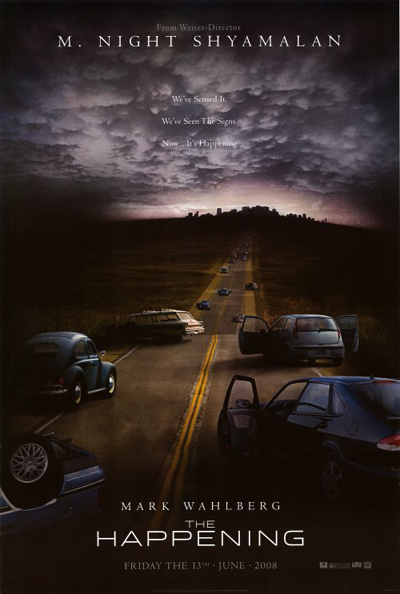
Science teacher Mark Wahlburg is summoned from his classroom after telling kids that some events are merely natural cycles that will never be explained (Galileo must be spinning in his grave) and learns a terrorist attack has threatened New York City. He calls his wife, Zooey Deschanel, and arranges to meet with a friend at the train station to evacuate. It is there that they have their marriage encounter as mobs of terrified civilians scramble to get aboard the train.
As they flee the city and the contagion spreads, they begin to realize the event is not a terrorist attack at all but a response from plants to the assault on the natural world by humankind.
The movie is filled with quietly gruesome scenes – a man lies down to allow a riding lawnmower to chop him to bits, or tree-trimmers hang themselves from the branches they were preparing to cut.
But it is the inane and distracting subplot between Wahlburg and Deschanel that ruins “The Happening.” Civilization is crumbling around them yet they pause – usually during moments of duress – to fret about their troubled relationship, which on the face of it doesn’t appear to be that troubled: Deschanel went out with a male coworker to enjoy an ice cream cone.
Not exactly “Who’s Afraid of Virginia Woolf.”
One more gripe: Throughout the movie the attack is referred to as “the event,” yet the title is “The Happening.” Why?
I think Shyamalan has succumbed to the bane of the untouchable creator – he who cannot be edited most desperately needs editing. It’s a shame because with a decent script and a more grounded director, “The Happening” could have been another sleeper like “The Sixth Sense.”
Del Stone Jr. is a former journalist and author.